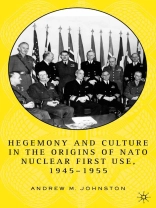Johnston argues that the preemptive first-use of nuclear weapons, long the foundation of American nuclear strategy, was not the carefully reasoned response to a growing Soviet conventional threat. Instead, it was part of a process of cultural ‘socialization’, by which the United States reconstituted the previously nationalist strategic cultures of the European allies into a seamless western community directed by Washington. Building a bridge between theory and practice, this book examines the usefulness of cultural theory in international history.
Содержание
The Persistence of Nuclear First-Use in History and Theory Culture, Strategy, and Empire The Persistence of the Old Regime: British, French and American Strategic Culture before 1949 Disembodied Military Planning: The Political-Economy of Conventional Strategy, 1949-1950 Mind the Gap: The Myth of the Lisbon Force Goals, 1951-1952 Two and a Half Strategies of Peripheralism: France, Britain and the Eisenhower Administration Two Cultures of Massive Retaliation: Neo-Isolationism and the Idealism of John Foster Dulles Hegemony Versus Multilateralism: Nuclear Sharing and the Search for Cohesion in the New Look Our Plans May Not be Purely Defensive: Leading NATO into the Nuclear Era Conclusion: What Does Culture Tell Us About Nuclear Strategy That We Were Afraid To Ask?
Об авторе
ANDREW JOHNSTON is Assistant Professor of History at the University of Western Ontario, Canada and Co-director of its Centre for American Studies.












